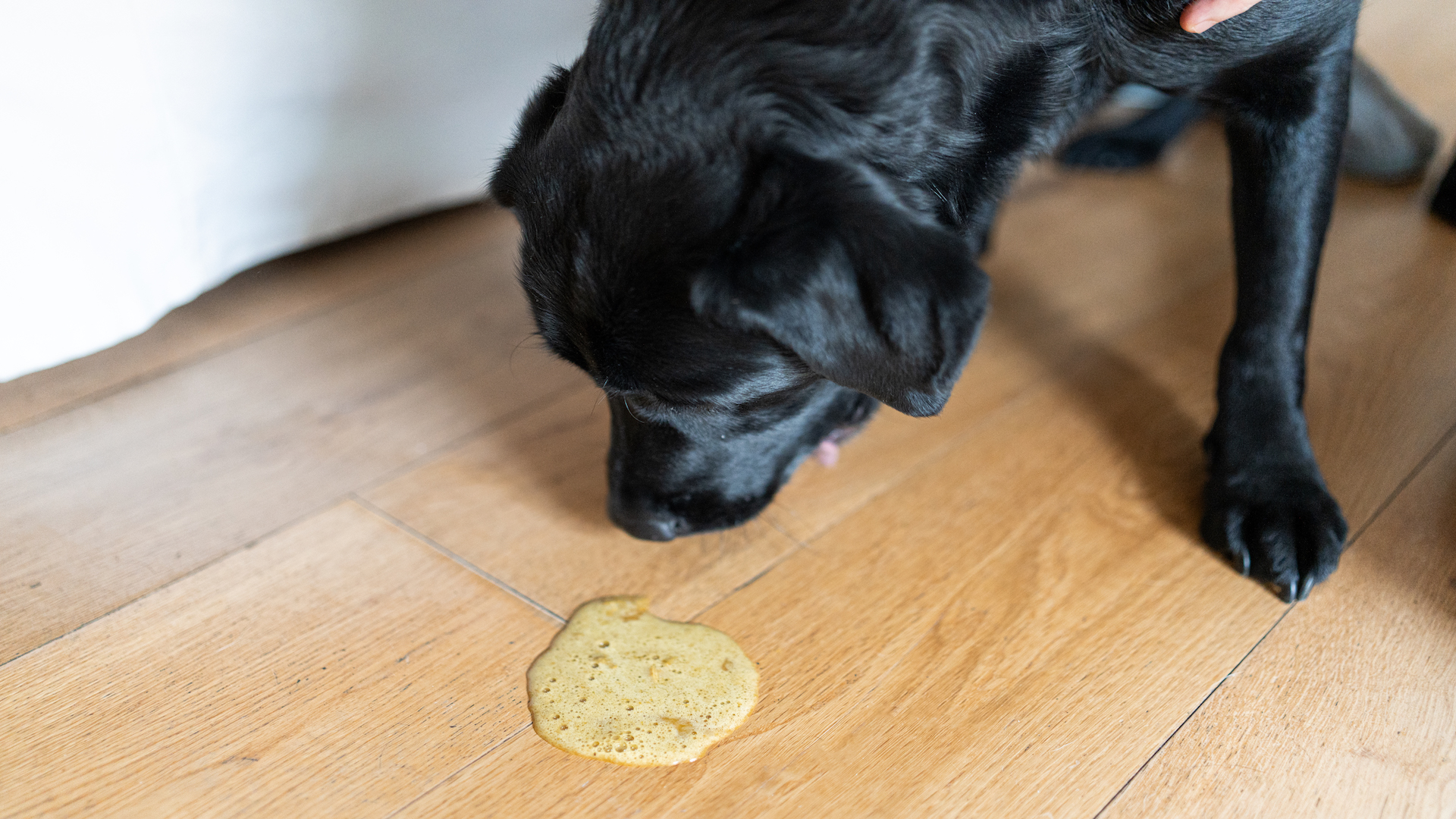Dog throwing up white foam: A vet's guide to causes and treatment
Is a dog throwing up white foam a common occurrence or something to be worried about?

Get the best advice, tips and top tech for your beloved Pets
You are now subscribed
Your newsletter sign-up was successful
Have you noticed your dog throwing up white foam? Then it's an understandable concern. Whilst an occasional episode of vomiting isn’t usually anything to be overly bothered about, any type of vomiting, particularly if it is persistent or regular, needs looking into further.
Vomiting, whether the contents are white froth or another color and texture, may require you to check you are feeding your dog the best dog food in the first instant, as poor quality food and food allergies can cause vomiting and digestive upsets. However, if your dog’s diet is A-OK, checking in with your veterinarian is advisable to really give you some answers if you’ve been wondering; is my dog sick? Throwing up white foam can be a sign of multiple underlying health conditions, some more urgent than others. In any event the cause needs isolating.
Read advice from our expert vet Dr. Elizabeth Racine as she investigates this issue, lists out possible reasons for the white foam vomiting episodes and what you need to do.

Small animal general practice veterinarian, Dr. Elizabeth Racine, is a specialist in pet health and wellness. She covers everything from veterinary behavior, internal medicine and nutrition. Away from her surgery, Dr. Racine writes for major companies in the industry from the American Kennel Club to Elanco and CareCredit to Bayer PetBasics.
Why is my dog throwing up white foam?
You may be familiar with your dog vomiting various colors, but what does white foamy vomit mean? The good news is that throwing up white foam is very common in dogs – white foam often happens when your dog is vomiting without food in their stomach. The fact that the vomit is white and foamy isn’t a concern in itself – but the reason they’re vomiting could still be a worry.
There are a number of reasons why dogs vomit, including vomiting white foam. Your dog may have eaten something that didn’t agree with his digestive system, particularly if he ate something outside of his normal diet. Vomiting can also be a sign of a number of underlying medical conditions, including:
- Gastroesophageal reflux (similar to heartburn)
- Inflammatory bowel disease
- Gastroenteritis
- Pancreatitis in dogs
- Foreign body
- Intestinal obstruction
- Parasite infection
- Toxin exposure
- Other gastrointestinal conditions
When should you be concerned about your dog throwing up white foam
With all the possible causes of vomiting, there’s every chance that you should worry about your dog if they start vomiting white foam. As the conditions listed above all have similar symptoms, it’s very important to see your veterinarian right away if your dog’s vomiting lasts for more than 24 hours or if it is accompanied by other symptoms such as lethargy, loss of appetite, diarrhea, fever, or other changes in health or behavior.
However, if your dog is sick once and has no other symptoms, especially if they’ve been eating grass, you can opt to monitor them at home. Watch closely for more vomit and any other symptoms.
Get the best advice, tips and top tech for your beloved Pets
One problem you should be very aware of is a type of bloat known as GDV. GDV in dogs is a life-threatening condition that requires emergency treatment. Whilst the classic signs are bloating and non-productive retching, sometimes dogs will bring up small amounts of white foam. If you think your dog has GDV you should contact the nearest open veterinary surgery immediately.
Diagnosing the cause of vomiting in dogs

When you bring your dog to the vet for vomiting, the first thing your vet will do is take a thorough history. This will involve asking you several questions about your dog’s recent health and behavior.
Your veterinarian will then perform a full head-to-tail physical examination, including feeling your dog’s abdomen for any signs of pain or abnormality. If necessary, your veterinarian may also recommend some additional diagnostic testing, such as radiographs (x-rays) to evaluate your dog’s digestive tract or evaluation of a fecal sample to look for signs of parasites.
These tests incur an additional cost, but they are necessary to help your veterinarian get to the bottom of your pet’s illness. Once the underlying cause of your dog’s vomiting has been diagnosed, your veterinarian will be able to prescribe an appropriate treatment to help get your dog back to his happy and healthy self again.
Can I treat my dog’s vomiting at home?
If your dog has been vomiting for more than 24 hours or is exhibiting any of the other symptoms listed above, it’s best not to try to treat your dog’s vomiting at home. Many over-the-counter medications and home remedies are not safe for dogs and could make your dog even sicker. And delays in treatment could have devastating effects on your dog’s health if the underlying cause of your dog’s vomiting is something serious. Instead, it’s best to take your dog to your veterinarian for appropriate diagnosis and any necessary treatment.
If your dog is over 6 months old, has been vomiting for less than 24 hours, and is bright, alert, and keeping water down, you don’t need to go to the vet unless you’re concerned. Instead, monitor your dog closely for deterioration. Make sure he has easy access to water. You can offer his usual diet in smaller portions every few hours.
Treating vomiting in dogs
The treatment for vomiting in dogs depends on the underlying cause of the vomiting. If your dog simply has an upset stomach from eating something he shouldn’t have – like something smelly he found out in the yard – then your veterinarian may prescribe a medication for nausea to stop your dog from vomiting. In many cases, this is all that is needed to stop the vomiting and get your dog back to his usual mischief!
If your dog’s vomiting is caused by a more severe issue, such as pancreatitis, then they may need to stay in the veterinary hospital. This allows your vet to provide your dog with more intensive care, including treatments such as intravenous fluids (IV fluids), anti-nausea medications, antacids, antibiotics, appetite stimulants, and a bland diet.
Although it can be scary to leave your pet in the hospital, quick and aggressive treatment can help your dog get better faster. When your pet is ready to go home, you may need to make some additional changes to his diet or daily routine to prevent the vomiting from recurring. Make sure to follow your veterinarian’s recommendations closely.
Unfortunately, if your dog is vomiting from ingesting a foreign object, then surgery is necessary to remove the obstruction safely. Your vet will provide you with an estimated cost as well as recovery plan, which usually involves staying in the hospital for a day or two before being discharged for strict rest at home.
Preventing vomiting in dogs
If your dog has been vomiting white foam, no doubt you are wondering how to prevent this from happening again in the future. To help prevent your dog from vomiting, feed a healthy diet as recommended by your veterinarian and avoid feeding too many treats. Avoid any sudden diet changes, which can cause an upset stomach and lead to vomiting.
Keep household cleaners and chemicals out of reach and be careful to keep your dog away from any areas where they’ve been recently used. Be sure to take away any broken or shredded toys so that your dog does not ingest small pieces, and keep any other objects your dog likes to chew out of reach. Finally, keep human foods out of your dog’s reach – especially toxic foods like chocolate, onions, and grapes!
If your dog is prone to scavenging on a walk, you may end up having to train them to wear a muzzle. This can be an excellent way to help prevent dogs from vomiting after eating things they shouldn’t.
If your dog has been vomiting white foam, it’s worth visiting your veterinarian to investigate the source of the problem. While many causes of vomiting can be minor, some can be more serious and can require immediate medical attention. Your vet can help you get to the bottom of the problem, so you and your dog can get back to your daily routine!
For more canine health advice dished up by an expert vet, check out our guide to diarrhea in dogs. You might also find helpful: My puppy would throw up during every car ride – this is how I trained her to enjoy the car.
Dr. Elizabeth Racine is a small animal general practice vet covering all things pet health and wellness. Her special interests include veterinary behavior, nutrition, and internal medicine.
As a freelance writer, Dr. Racine has written content for major companies in the industry such as the American Kennel Club, Merck Animal Health, Bayer PetBasics, Elanco, and CareCredit. In her free time, Dr. Racine enjoys playing trampoline dodgeball, hiking with her beagle Dasher, and spending time with her three mischievous cats.
